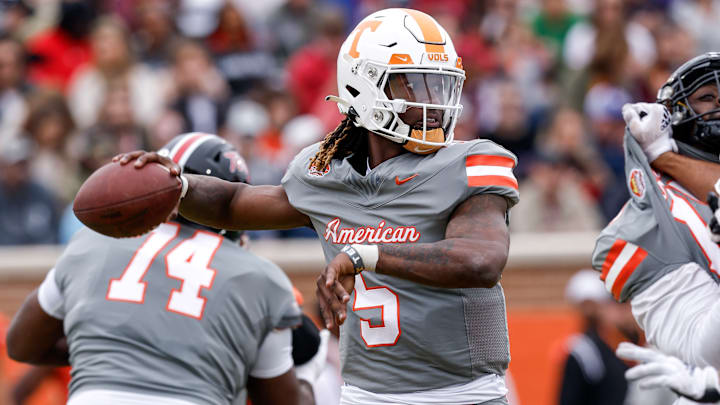The Patriots didn’t have a perfect draft. It started promisingly (if they give Drake Maye time), then it took some odd turns in the middle.
But they pulled a masterstroke or two late on the third day, like when they took FSU tight end Jaheim Bell, who projected to be a fifth-round pick in the seventh round. More impressively than that, they managed to snag Joe Milton III in the sixth.
The former Tennessee quarterback has the potential to be the best in the 2024 class, but he will need more game time than he was afforded in college, if that is even what the Patriots have in mind.
Rumors abound that NFL teams didn't envisage Milton III playing quarterback in the league. So, could he change positions and convert to tight end?
Converting Joe Milton III to a tight end might be a bad idea for the Patriots
Well, Mike Tice and Jay Riemersma both did it. However, neither is known for what they did on the football field, so that isn't really saying much.
Looking at a more recent example, Logan Thomas is the most current quarterback turned tight end and is part of the Commanders. He played two games at quarterback for the Cardinals and didn't convert to tight end until he signed for the Bills the following season. He then moved to Detroit before becoming a regular on the Commanders roster.
Thomas only caught 35 passes in his first three seasons as a tight end, so converting appears to be a long-term project.
Despite spending three years at Michigan and three more in Tennessee, Milton III only started one full season and 43 games in total at quarterback (Maye started 30 in just three years). But he could turn out to be the best pick anyone made in 2024.
He arguably has better footwork than Drake Maye, and at 235 lbs. , he may be more suited to playing behind the Patriots’ hotch-potch offensive line. So why did The Athletic suggest NFL teams want to convert him to tight end?
After all, it didn’t work when Tim Tebow tried it. It went so badly when Jeff Driskel tried it that he immediately returned to playing quarterback. It only sort of works for Taysom Hill (who ran the same 40-yard time as Milton III) because they use him as a wild-cat QB, running back, and wide receiver.
In fact, it’s easier to find college quarterbacks who have successfully converted to wide receivers.
Terrelle Pryor recorded a 1,000-receiving-yard season for the Browns after scoring the longest rushing touchdown in history as a Raiders QB. Julian Edelman played quarterback at Kent State and ended up playing 11 years as a receiver, winning three Super Bowls.
Antwaan Randle-El, Anquan Boldin, and Hines Ward are all high on the list of NFL receivers who played some quarterback before they turned professional.
Based on history, Milton converting to a tight end doesn't seem worth it in the long run
So why do teams imagine quarterbacks can be tight ends?
Partly because everyone plays quarterback at some stage; that's why punters are so good at throwing passes on fake punts. Travis Kelce played quarterback in high school and stepped in as a wild-cat quarterback for the Bearcats. But it's also partly because a quarterback’s “football IQ” involves knowing and understanding what every player needs to do on every play.
It goes without saying they must know the routes each skill player will run. That explains why athletic quarterbacks can succeed as receivers. However, they must also work with the center to adjust blocking schemes based on how the defense lines up. Blocking is where lining up at tight end is drastically different from playing quarterback.
Quarterbacks are usually actively discouraged from attempting to block defensive linemen or linebackers. But even pass-catching tight ends require a block before they can start running a route.
Does it ever succeed, though? Well, that depends on how you define success. If you compiled a list of players who have successfully converted to play tight end in the NFL, most would have begun their sporting career as college basketball players, not quarterbacks. Quarterbacks don’t have to “box out” or rebound the ball like a power forward does, so it's pretty different.
More recent examples of quarterbacks who have converted to tight end involve players who changed during their college careers. Blake Bell, Heath Bell, and Tanner Hudson have all won Super Bowls as tight ends but began their college careers as quarterbacks. Hudson transitioned to receiver before eventually settling at tight end.
Historic examples of college quarterbacks who converted didn't win as much silverware as their contemporary counterparts. Tice played 177 games but only racked up 894 receiving yards. His playing career ended in 1995, and he transitioned to coaching the next season.
He was a man mountain, too. At 6 feet 7 inches tall, he could have easily played on the offensive line. Riemersma played 112 games over eight years, amassing 2,524 receiving yards along the way. Both Tice and Riemersma weighed over 250 lbs, 15 pounds heavier than Milton III.
Even Logan Thomas is an inch taller and 15 pounds heavier than Milton III. Milton III is 10 pounds lighter than Mike Gesicki, and Patriots fans saw how he struggled to pass block last season.
Milton III might not have started many games as a quarterback in college, but he didn’t start any at tight end. For his part, when he was asked about converting to tight end, he said, “That’ll never happen.”
The Patriots also signed his college tight end Jacob Warren (who is 6 feet 6 inches tall and weighs 253 lbs.) as an undrafted free agent, so the tight end stocks are bursting at the seams now.
With six tight ends already competing for three roster spots, they shouldn’t convert Milton III, too, but that doesn’t mean they won’t try.
